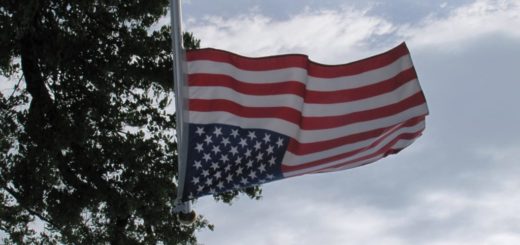“Protesting is a non-essential activity”
The police department in Raleigh, North Carolina, United Shutdowns of America, has arrested citizens who gathered to protest against the state’s overt denial of constitutional rights. Citing the governor’s official stay-at-home orders — precisely the policy that the protesters were challenging — the police department defended its thuggery by declaring that “protesting is a non-essential activity.”
Let’s parse that clause, shall we?
The subject of the clause, “protesting,” is a gerund, derived from the verb “to protest.” It names the activity of expressing dissent or disapproval. Dissenting from what? That, of course, is determined by the context. In this case, since the situation involves a citizens’ gathering to express disapproval of the state’s emergency powers declaration, according to which healthy, law-abiding citizens have been mandated to stay at home during what is effectively a nastier than usual flu season, which, apart from being a manifestly excessive response to this pandemic — “manifestly” in this case meaning “clear from readily available data and information gathered internationally over a course of months” — is also costing many of these citizens significant material and psychological harm, we can see that the context is entirely of a political nature, i.e., it involves the relationship of citizens to government.
Therefore, given the inherently political nature of this context — an expression of dissent against a government’s edicts — we may properly call the activity in question a political protest. Thus, this particular case of expressing dissent falls within the arena of what, in the modern democratic world, used to be called “asserting one’s rights,” or “standing up for one’s rights.” So in the police department’s clause, “protesting is a non-essential activity,” the “protesting” at issue is specifically political protesting, related to the defense or assertion of the rights of the protesters.
The state’s verb, “is,” indicates that this clause has the purpose of defining or describing the activity of political protesting as such. For example, if I say “Running is a healthy activity,” I am describing running by subsuming it under the broader category of healthy activities, by means of the verb “to be.”
The indefinite article, “a,” establishes that the subject (in this case “protesting”) is going to be placed into a broader category of which it is merely one instance, but not the only one. The broader category is named immediately after the article, with the words “non-essential activity.”
An activity is something humans do, specifically a willed action rather than an involuntary behavior. For example, falling would not normally be designated an activity, for it is almost by definition passive in character — falling happens to a person, rather than being done by him — whereas writing, by contrast, is an activity, for it cannot normally occur other than as an act of will on the part of the person who writes.
“Non-essential” is the negation of “essential.” Something is essential if it is necessary or definitionally inherent, as determined by the context in which essentiality is being ascribed. For instance, to say that a trait is essential to a species is to say that this is not merely something that may be found within some members of that species (like brown eyes or being six feet tall), but rather that an entity may not be described as a member of that species at all, in the strictest sense, if it does not possess that trait, either actively or latently. (For an example of what I mean by “either actively or latently,” we may say that rationality is an essential human characteristic, even if no one is actively using his rational faculty at this or that moment.)
Thus, to say that a thing or activity is non-essential is to say that it is neither necessary nor definitionally inherent to the context or situation in question.
In sum, then, the statement “Protesting is a non-essential activity” must be understood to mean that expressing political dissent falls among those willed behaviors that are neither necessary nor definitionally inherent (whether actively or latently) to…to what?
The question here, one not explicitly answered in the government’s statement, is: What is the context in relation to which political dissent is being judged non-essential? Everything depends on this implied context. For example, we might reasonably say that expressions of political dissent are non-essential to the world of sartorial fashion, inasmuch as holding or asserting a position of political disagreement is in no way definitionally inherent in the realm of clothing design, production, or display.
The statement currently in question, however, is coming from the police, who are citing as their authority a government mandate regarding a declared state of emergency within their jurisdiction. And the activity they are judging non-essential is precisely an activity related to public disapproval of that same government mandate. That is to say, the context is fundamentally political, in the strictest sense of the word, i.e., related to the system, methods, and execution of governance or political rule within a community.
It is therefore in this specifically and strictly political context that the Raleigh police are saying, with the full authority of the government of North Carolina, that “protesting is a non-essential activity,” meaning that the active or latent expression of disapproval with government policy is not a necessary or definitionally inherent feature of a properly functioning political community.
In other words, following the above analysis, the official position of the government of North Carolina is that the actual or potential expression of political dissent is not essential to political life.
Now, what kind of political community would define itself in such a way as to exclude the expression of political dissent from its essence? What kind of governing authority sees the direct outlawing of active dissent — sending in the police to arrest (peaceful) protesters against state policy on the grounds that public political assembly itself is a violation of the law — as an unproblematic manifestation of its proper mandate? And what kind of society allows the state itself to define and redefine, on its own authority, the terms according to which political dissent as such, i.e., the expression of disagreement with the government, may be permissible?
That we are even reduced to asking such questions — and not even with regard to California or New York, but North Carolina — is evidence of how far down the memory hole has fallen the last tattered remnant of America as founded.
Who says grammar isn’t fun?



